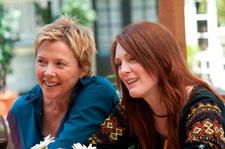At the outset of The Kids Are All Right, we get a peek into a modern lesbian family that’s almost Rockwellesque in its mundaneness. Nic (Annette Bening) is a workaholic OB/GYN who still makes it home for dinner nightly with her partner, Jules (Julianne Moore), and their children, Joni and Laser (Mia Wasikowska and Josh Hutcherson). Completing the picture of perfection, Joni’s recently won a national science scholarship and is on her way to college.
But that flawless veneer barely masks the faultlines that threaten to rupture at any minute. Jules is unsatisfied as a stay-at-home mom and is frustrated that Nic’s work schedule prevents them from sharing physical intimacy. Laser is desperate for a father figure, and the skater kid he hangs out with gives his moms the creeps. And Joni just wants to get out of the house to start her adulthood.
Into the mix comes Paul (Mark Ruffalo), a charming hippie restaurateur and organic farmer, and the result of Laser and Joni’s search for their sperm-donor father. He, too, is taken in by the sheen of familial perfection and tries to become a part of the lives of the children he has never known, but in the process he lights the fuse on the powder keg that is this family.
The all-star cast gives knockout performances that leave you alternately laughing along with their awkward interactions or reeling from the moments of painful emotional intensity. Bening delivers a heartbreaking turn as the de facto matriarch who lets her guard down just long enough to be ripped asunder by her family’s betrayal to the new father. Ruffalo’s shaggy hippie, seemingly a being of pure sensuality at first, gradually reveals the great sense of loss he feels at never having had a family of his own.
Writer-director Lisa Cholodenko, known in indie circles for her previous films Cavedweller, Laurel Canyon and High Art, says that it’s still daring to make a film about lesbian parents.
“There were times when I felt insecure that it wasn’t going to have a life outside of my computer, but we just toiled away, and the more that we wrote and the characters found their life on the page, the more confident we were that the work would come out,” she says.
The film touches on universal themes, recognizable in families of all types.
“There’s a lot of things that people are going to be able to interpret for themselves and relate to,” Cholodenko says. “I think that the idea that parents fight to stay together, and the commitment it takes to keep a marriage strong, what it means to be a good parent and protect your children and let them grow up and become adults…. It doesn’t matter if you’re a gay or straight family, those struggles pertain to all families.”
Moore turns in a moving performance as a self-described “sad-sack middle-aged lesbian” whose desperation for validation from someone who loves her sends her into the arms of her children’s father, even as she tries to revitalize her relationship with her partner. But Cholodenko says the character is not trying to escape her lesbianism.
“She’s at a point where she’s feeling vulnerable in her relationship, her identity and her personal life. She has these questions about aging and relating to herself, and there’s an energy there in his relationship with her children,” she says.
Ironically, what becomes the strongest endorsement of the picture-perfect family from the film’s first reel is how desperately Paul wants to be a part of it. While it would be easy to dismiss him as an interloper — and at one point in the movie, Nic does just that — it’s also true that this family interrupts his previously idyllic life: they use his sperm, the kids track him down, Jules initiates an affair with him. He is drawn into their drama, and in the end, he’s changed as much — if not more — by the encounter as anyone. By the conclusion, the hurt is evenly distributed, and the audience easily sympathizes with everyone.
“There was a question with [co-writer] Stuart Blumberg and I if Paul was sympathetic enough,” Cholodenko says. “Once we hooked into what was wonderful about him, how he needed to grow as a person, and where he needed to land, and what he was going to get from this experience, meeting these people, and then bottoming out. I’m not sure if everyone’s going to read it that way. He’s on a personal path, and the things he needs to learn happen with the wrong people at the wrong time.”
Watch the trailer below:


 Why you can trust Xtra
Why you can trust Xtra


